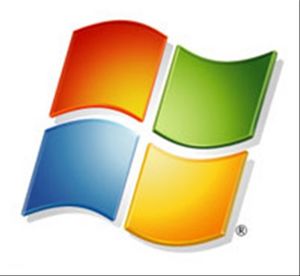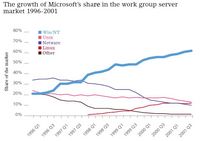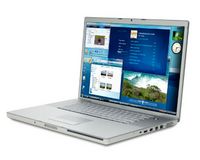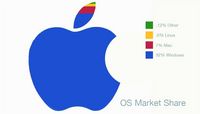Microsoft, the Monopoly
Microsoft is a worldwide player and is the most powerful firm in the software market, it is evident that Microsoft plays a huge role in the computer software industry. Microsoft was first founded in 1975 and first incorporated in 1981. Microsoft started off primarily as a supplier to hardware manufacturers such as IBM, since then Microsoft has come a very long way. In the year 1990, Microsoft became the first software company to reach one billion dollars in revenue and has continued to grow with their windows software. Not only is Microsoft a major part of the computer software industry, it is also involved in cable television (MSNBC), business diagramming and technical software, and the development of computer-like devices such as mobile phones, pocket organizers, digital televisions, digital cameras just to name a few. Microsoft is ever expanding in both realms inside and outside the computer software industry which also leads it to acquire many critics. These critics believe the company’s goal to be acquiring control of every delivery channel of information. “Microsoft has the power to exercise predatory and exclusionary control over the very means for people to access the Internet and all it represents," says Scott McNealy of rival company Sun Microsystems. With Microsoft as a dominant company in computer technologies worldwide, it affects society both positively and negatively.
Contents
Issue:
Microsoft’s ability to manipulate the consumer and suppress other firms and what governments, individuals and other firms can do about it.
Thesis
Microsoft has used predatory and manipulative business practices to take advantage of consumers and other software firms. Governments must continue to take strong action to protect consumers and force Microsoft to increase transparency and discourage anti-competitive business practices.
Anti-Competitive Actions Taken by Microsoft
Microsoft has taken part in a number of anti-competetive actions in the past, so as to ensure that it maintains control over the market:
Predatory Pricing
A dominant firm engages in predatory pricing when it sells its products at a price that is below cost causing the firm to incur a loss. In order to stay competitive, the firm's competitors must also lower the price of their products. In the end, the smaller, weaker firms who has less money become bankrupt, thus elminiating competition for the dominant firm. Microsoft has repeatedly performed predatory pricing in order to drive competition out of the market. For example, in 1996, Microsoft offered Internet Explorer for free. By offering Internet Explorer to consumers for free, Microsoft drove its (at the time) leading competitor, Netscape Communications Corp, out of its dominant position in the web browser market.
Acquisition of Competitor Firms
Microsoft also has a history of buying out competitor's firms, as well as acquiring firms in markets other than computer software. The first firm that Microsoft purchased, in 1987, was Forethought. Forethought's presentation program was the ancestor of the modern day Microsoft Powerpoint (and indeed, was the earliest version of Microsoft Powerpoint). Since 1994, Microsoft has purchased 104 different firms, and is averaging 6 firms acquired per year. In 2008 alone, Microsoft has already acquired 16 competitor companies. Microsoft was denied the purchase of Intuit (a software company that sells a leading personal finance program) due to the claim that this would further concentrate too much market power into one firm.
Collusion with Firms in other Markets
When Microsoft is unable to purchase a firm in another market, it has resorted to collusion. While collusion is technically nothing more than cooperation, various anti-trust laws have been set up by different governments to ensure that no one firm or group of firms has too much market power. Despite this, Microsoft has repeatedly broken these anti-trust laws. Microsoft has established an arrangement with all 12 notebook manufacturers of Poland to have Windows OS pre-installed on the notebooks. The customer who buys the notebook is unable to have the Windows OS reimbursed in lieu of using another operating system, and thus has to use Windows. Many manufactures admitted that, while there was no official, formal agreement with Microsoft, the terms of cooperation that Microsoft set were simply too beneficial for the manufacturers to refuse.
Past Sanctions Against Microsoft
European Union
In February of 2008 the European Union’s antitrust commission fined Microsoft a record $1.3B US for violation of their 2004 antitrust order related to Microsoft’s unreasonable prices for access to its source code. For competing software firms to produce programs that would be compatible with Windows and Microsoft’s server operating system they must have access to the source code behind these operating systems. By charging excessively high rates for firms to access this source code Microsoft can directly increase revenue and indirectly reduce competition because there will be fewer programs on the market to rival Microsoft products such as Word and Excel. Microsoft has responded to this ruling by stating that they are now working under new and more transparent business principals and these issues will not recur. Prior to the commission’s ruling Microsoft had been charging a 3.87% royalty for firms using Microsoft source code to produce other software. They have agreed to reduce the royalty to 0.5% in the European Union. Worldwide rates will remain unchanged at approximately 4% depending on the country and the type of software being developed. Microsoft has also agreed to release source documentation for the A.P.I.s (application programming interfaces) and communication protocols between Office 2007, SQL Server 2008, and Office SharePoint Server 2008. This release is primarily a response to pressure applied from European Union and U.S. Federal officials it is also in part a measure to maintain competitive with rival firms such as Google which are gaining market share with their open source programs.
United States
The U.S. federal government and 18 state governments filed a suit against Microsoft for abusing monopoly power to limit the ability of other firms to produce software that would be compatible with Microsoft Windows. They accused Microsoft of alternating their A.P.I.s to give preferential treatment to Microsoft programs. A.P.I.s are the basic programs which allow an operating system to support application programs. The suit accused Microsoft of designing theirs so that non-Microsoft program would operate slower than their Microsoft equivalents and to prevent some non-Microsoft programs from being able to put a shortcut icon on a user’s desktop. The suit also raised the issue that the providing Internet Explorer and Windows Media Player free with Windows operating systems was an example of predatory pricing with the explicit intent to force other internet browsers and media platforms out of the market. This suit was settled in November 2001, Microsoft agreed to release application programming interfaces but Microsoft remained able to bundle software including Internet Explorer and Windows Media Player. Many critics called this concession to be merely symbolic and that it would not improve the level of competition in the software industry in a meaningful way. In March of 2002 Sun Microsystems, the producer of Java, launched a suit against Microsoft for failing to release source code for Internet Explorer and Microsoft’s refusal to sell Internet Explorer and Windows XP with Java included. Sun has accused Microsoft of using their market power to make their products a mandatory part of the internet and create “Microsoft controlled choke points to internet access” said Sun Microsystems’ general counsel Michael Morris. This presents an immense threat to the consumer and society as a whole. Nearly all commercial, personal and governmental transfer of information uses the internet in some form. If one firm were to gain control of the internet it would allow them to profit immensely, but more threateningly it would concentrate an extreme amount of power in the hands of Microsoft. In December 2002 a California judge granted injunctions requested by Sun against Microsoft this injunction forced Microsoft to package Java with Internet Explorer so that Java based web applications can be viewed with Explorer without having to download Java separately. This was viewed by Sun Microsystems and many in the software industry as a major win for the software industry because it allows developers to create Java based programs that will be compatible with Internet Explorer.
Negative Effects of Microsoft's Monopoly
Microsoft has no close competitors selling a similar product in the market for computer operating systems, and is therefore effectively a monopoly. As a monopoly, Microsoft sets the price for its own products, rather than allowing the supply and demand of the free market set the price. This results in Microsoft's products being a considerably higher price than they would be in a non-monopolistic environment. Additionally, without significant competition, Microsoft has no incentive to make top-quality products or continue to innovate. Microsoft can produce lower-quality products while still maintaining most of its market share and not incur the costs of having to “keep up” with competition. This isn't to say that Microsoft's products are of "poor quality", but that they are of poorer quality than they would be if Microsoft had competition of significant size and market influence.
Positive Effects of Microsoft's Monopoly
Microsoft invests heavily in research, development, and innovation. It has dedicated research to enhancing user experience with computer devices, reducing the cost of writing and maintaining software, and to inventing new computing devices. Microsoft researchers include computer scientists, sociologists, psychologists, mathematicians, physicists, and engineers. They conduct research on programming languages, security, and next-generation interface. Microsoft’s realm of innovation and development is not strictly attached only to computer software products; it also creates products for multimedia such as the Xbox gaming system, digital entertainment, slide innovations and much more. Another benefit of Microsoft as a monopoly is that it is a well known name and can therefore be trusted more. The majority of schools and companies use Microsoft applications such as Microsoft Word, Power Point, Excel, and Access. This gives Microsoft home users an advantage as their work will be compatible for both home and work or school. Also, since students learn basic skills of Microsoft programs at school, they will have that knowledge when they enter the workforce. In addition, it is easier to use and learn one common system. Not only does Microsoft constantly develop new innovations, they also offer a variety of different computer software that caters to specific needs of the consumer. To name a few, Microsoft has Microsoft Dynamics, Forefront, Office Live, and servers available for the business; Microsoft Expression and Silverlight for the designer; and Microsoft Office, Encarta, and Money for the home user.
Potential Solutions
Creating and enforcing consequences for Microsoft's uncompetitive actions remains a possible solution to the monopoly situation. However, many of the sanctions against Microsoft have proven to be ineffective, as Microsoft still continues with its anti-competitive practices. Perhaps the most effective solution is the consumers' refusal to buy microsoft products. There are alternative firms that produce computer software, like Apple's Mac OS. Consumers who are unhappy with either Microsoft's monopolistic nature or their products have switched to alternative products from other companies. In doing so, consumers could potentially turn other firms into serious competitors of Microsoft, ending the monopoly.
The Rise of Apple
The most well-known and strongest competitor to Microsoft is Apple Inc. An American multinational corporation with a focus on designing and manufacturing software products, as well as consumer electronics, Apple has about 28,000 employees worldwide and had worldwide annual sales of US$24 billion in its fiscal year ending September 29, 2007. Apple controls about 7% of the operating system market share, compared to Microsoft owning 92%. While 7% is relatively small, it is still the largest competitor of Microsoft. Apple produces primarily, Mac OS X Operating System, iTunes media browser, the iLife suite of multimedia and creativity software, and Final Cut Studio Express, a suite of professional audio- and film-industry software products. Apple also produces a variety of hardware, most notably the iPod, iPhone, and the Macintosh line of computers. Despite Apple's success in the hardware industry, Microsoft still owns the majority of the market shares of the operating system market.
Conclusion
Governments have taken a much stronger position against Microsoft since 2002 and these harsh rulings begun to influence Microsoft’s business decisions. Consumers have also begun to demand innovation and choice, this has lead to Microsoft losing market share to firms such as Apple. If governments continue to enact and enforce strong regulation and consumers continue to demand change then Microsoft will be forced to change in order to remain profitable.
References
Angela
http://www.news.cnet.com/8301-10784_3-9895558-7.html
http://www.computerworld.com/action/article.do?command=viewArticleBasic&articleId=9115988
http://stadium.weblogsinc.com/engadget/videos/Apple-Psystar-complaint.pdf
http://www.apple.com/pr/library/2007/10/22results.html
http://store.apple.com/us/browse/home/shop_mac/software?mco=MTE2ODk
http://www.pcworld.com/article/136949/is_apple_the_new_microsoft.html
http://news.cnet.com/2100-1040-232565.html
http://www3.interscience.wiley.com/journal/118545357/abstract
http://www.roughlydrafted.com/RD/Q4.06/3EC02E78-FD4D-4CDF-92A0-9C4CBDFAB3D2.html
Anna
http://www.fundinguniverse.com/company-histories/Microsoft-Corporation-Company-History.html
http://cep.lse.ac.uk/pubs/download/cp223.pdf
http://research.microsoft.com/news/featurestories/publish/Hon_1008.aspx
http://www.thisnation.com/question/027.html
http://ca.encarta.msn.com/encnet/features/dictionary/DictionaryResults.aspx?refid=1861631067
http://www.usdoj.gov/atr/cases/f3800/msjudgex.htm
http://online.wsj.com/public/article/SB116490323676636989-HnHPKLzkyy9xKy2wnokbd2bc_bE_20071130.html
http://www.microsoft.com/about/brandcampaigns/innovation/default.mspx
http://windowsitpro.com/Articles/Index.cfm?ArticleID=40481&DisplayTab=Article
Bennet
http://www.microsoft.com/msft/acquisitions/history.mspx
http://www.businessweek.com/1998/47/b3605129.htm
http://www.uokik.gov.pl/en/press_office/press_releases/art124.html
http://www.microsoft.com/presspass/presskits/eucase/default.mspx
http://www.microsoft.com/presspass/presskits/eucase/docs/cp070063en.pdf
http://www.microsoft.com/presspass/insidefacts_ms.mspx
http://www.microsoft.com/presspass/presskits/eucase/docs/T-201-04EN.pdf
http://www.microsoft.com/presspass/legal/european/EU_Competition_Overview.mspx
http://itknowledgeexchange.techtarget.com
http://dogopus.com/blog/wp-content/
Devin
http://www.theglobeandmail.com/servlet/story/RTGAM.20080227.weumicrosoft0227/BNStory/Technology/home
http://news.cnet.com/2100-1023_3-204317.html
http://www.cnn.com/2004/BUSINESS/03/24/microsoft.eu/
http://news.bbc.co.uk/2/hi/business/652150.stm
http://www.networkworld.com/news/2008/022108-microsoft-open-source.html
http://www.news.cnet.com/2100-1001-855785.html
http://www.webmasterworld.com/msft/3586056.htm




